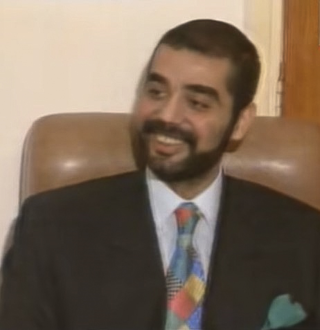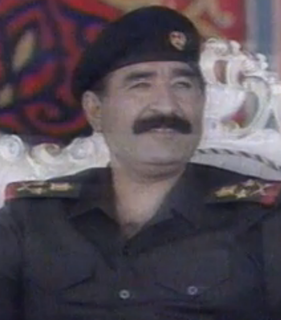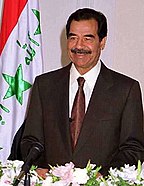
Iraq actively researched and later employed weapons of mass destruction from 1962 to 1991, when it destroyed its chemical weapons stockpile and halted its biological and nuclear weapon programs. The fifth president of Iraq, Saddam Hussein, was internationally condemned for his use of chemical weapons during the 1980s campaign against Iranian and Kurdish civilians during and after the Iran–Iraq War. In the 1980s, Saddam pursued an extensive biological weapons program and a nuclear weapons program, though no nuclear bomb was built. After the Persian Gulf War (1990-1991), the United Nations located and destroyed large quantities of Iraqi chemical weapons and related equipment and materials, and Iraq ceased its chemical, biological and nuclear programs.

Uday Saddam Hussein al-Tikriti was the eldest child of Saddam Hussein by his first wife, Sajida Talfah, and the brother of Qusay Hussein. Uday was seen, for several years, as the likely successor to his father, but lost the place as heir apparent to Qusay due to injuries he sustained in an assassination attempt, his increasingly erratic behavior, and his troubled relationship with the family.

Iraq's era under President Saddam Hussein was notorious for its severe violations of human rights. Secret police, state terrorism, torture, mass murder, rape, deportations, forced disappearances, assassinations, chemical warfare, and the destruction of southern Iraq's marshes were some of the methods the country's Ba'athist government used to maintain control. The total number of deaths related to torture and murder during this period are unknown. Human Rights Watch and Amnesty International issued regular reports of widespread imprisonment and torture.
Samira Shahbandar is a former flight attendant, and was the second wife of Saddam Hussein, and the mother of his third son.

Hussein Kamel Hassan al-Majid was the son-in-law and second cousin of Iraqi leader Saddam Hussein. He defected to Jordan and assisted United Nations Special Commission (UNSCOM) and International Atomic Energy Agency (IAEA) inspection teams assigned to look for weapons of mass destruction in Iraq.

After the 2003 invasion of Iraq, evidence began to emerge of failed attempts by the Iraqi government to bring the conflict to a peaceful resolution.

The Iraq Liberation Act of 1998 is a United States Congressional statement of policy stating that "It should be the policy of the United States to support efforts to remove the regime headed by Saddam Hussein from power in Iraq ..." It was signed into law by President Bill Clinton, and states that it is the policy of the United States to support democratic movements within Iraq. The Act was cited in October 2002 to argue for the authorization of military force against the Iraqi government.
The following lists events in the year 2003 in Iraq.
Events in the year 2002 in Iraq.
Elections in Iraq gives information on election and election results in Iraq.

The Trial of Saddam Hussein was the trial of the deposed President of Iraq Saddam Hussein by the Iraqi Interim Government for crimes against humanity during his time in office.

Awad Hamad al-Bandar was an Iraqi chief judge under Saddam Hussein's presidency. He was a member of the Arab Socialist Ba'ath Party and was the head of the Revolutionary Court which issued death sentences against 143 Dujail residents, in the aftermath of the failed assassination attempt on the president on 8 July 1982.

The Iraqi Armed Forces are the military forces of the Government of Iraq. They consist of the Iraqi Army, the Iraqi Air Force, and the Iraqi Navy.

The execution of former Iraqi President Saddam Hussein took place on Saturday, 30 December 2006. Saddam was sentenced to death by hanging, after being convicted of crimes against humanity by the Iraqi Special Tribunal for the murder of 148 Iraqi Shi'ites in the town of Dujail in 1982, in retaliation for an assassination attempt against him.

Adnan Khairallah, was Saddam Hussein's brother-in-law and cousin. He held several titles and was a member of the Iraqi Revolutionary Command Council. He also served as the Defence Minister of Iraq from 1979 to his death, having been appointed days after Saddam Hussein succeeded to the Presidency. He died in 1989 in a helicopter crash that was officially labeled an accident. The circumstances surrounding his death, including his disputes with Saddam and rumors of a potential coup have led some to believe Khairallah was assassinated under orders from Saddam.

The Iraqi presidential election of 1995 took place on October 15 of that year. It was the first direct presidential election under the rule of Saddam Hussein, who had seized power through the Revolutionary Command Council in 1979. Taking the form of a referendum with no other candidates, the election involved giving voters paper ballots that said: "Do you approve of President Saddam Hussein being the President of the Republic?" They then used pens to mark "yes" or "no". The next day, Izzat Ibrahim, Hussein's deputy in the ruling Revolutionary Command Council (RCC), announced the incumbent had won 99.96% of some 8.4 million valid votes cast. Officially, 3,052 people voted against him, and turnout was 99.47%. The international community reacted with widespread incredulity to these figures.

The lead-up to the Iraq War began with United Nations Security Council Resolution 687 and subsequent UN weapons inspectors inside Iraq. This period also saw low-level hostilities between Iraq and the United States-led coalition from 1991–2003.
The timeline of the Gulf War details the dates of the major events of the 1990–1991 war. It began with the Iraqi invasion of Kuwait on 2 August 1990 and ended with the Liberation of Kuwait by Coalition forces. Iraq subsequently agreed to the United Nations' demands on 28 February 1991. The war officially concluded with the signing of the armistice on 11 April 1991. Major events in the aftermath include anti-Saddam Hussein uprisings in Iraq, massacres against the Kurds by the regime, Iraq formally recognizing the sovereignty of Kuwait in 1994, and eventually ending its cooperation with the United Nations Special Commission in 1998.
The 1979 Ba'ath Party Purge was a public purge of the Iraqi Ba'ath Party orchestrated on July 22, 1979 by then-president Saddam Hussein.













